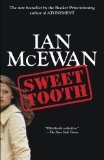Summary | Excerpt | Reading Guide | Reviews | Beyond the Book | Readalikes | Genres & Themes | Author Bio

A Novel
by Ian McEwan
Even as she says all this he is thinking what an attractive prospect it is. He could turn his back on those awful kids, who never keep quiet or stay in their seats in his classes. He could stop pretending to care whether they ever spoke a word of French. And he likes being with his children. He would get them to their school and playgroup, then take a couple of hours for himself, perhaps fulfill an old ambition and get some writing done before picking up Jake and giving him lunch. Then an afternoon of childcare and light housework. Bliss. Let her be the wage slave. But they are having a row and he is in no mood to make conciliatory offers. He brings Monica back sharply to the mugging. He challenges her again to call him a liar, he tells her to go to the police station and read his statement. In reply, she leaves the room, slamming the door hard behind her.
A sour peace prevails, the holidays end and he goes back to work. It's as bad as ever at school. The kids are absorbing from the culture at large a cocky spirit of rebellion. Hash, spirits and tobacco were playground currencies, and teachers, including the headmaster, are confused, half believing that this atmosphere of insurrection is a token of the very freedom and creativity they are supposed to be imparting, and half aware that nothing is being taught or learned and the school is going to the dogs. The "sixties," whatever they were, have entered this decade wearing a sinister new mask. The same drugs that were said to have brought peace and light to middle-class students were now shrinking the prospects of the hard-edged urban poor. Fifteen-year-olds come to Sebastian's classes stoned or drunk or both. Kids younger than them have taken LSD in the playground and have to be sent home. Ex-pupils sell drugs at the school gates, standing there openly with their wares alongside the mums and their pushchairs. The headmaster dithers, everyone dithers.
At the end of the day Sebastian is often hoarse from raising his voice in class. Walking home slowly is his one comfort, when he can be alone with his thoughts as he makes his way from one bleak setting to another. It's a relief that Monica is out at evening classes four times a week—yoga, German lessons, angelology. Otherwise, they step around each other at home, speaking only to manage the household. He sleeps in the spare room, explaining to the children that his snoring keeps Mummy awake. He is ready to give up his job so that she can go back to hers. But he can't forget that she thinks he's the sort of man who can drink away the children's Christmas. And then lie about it. Clearly, there is a far deeper problem. Their trust in each other has vanished and their marriage is in crisis. Swapping roles with her would be merely cosmetic. The thought of divorce fills him with horror. What wrangling and stupidity would follow! How could they inflict such pain and sadness on Naomi and Jake? It is his and Monica's responsibility to sort this matter out. But he does not know how to begin. Whenever he thinks of that boy and the kitchen knife in his hand, the old anger returns. Monica's refusal to believe him, to believe in him, has broken a vital bond and seems to him a monstrous betrayal.
And then there is the money: there is never enough money. In January their twelve-year-old car needs a new clutch. This in turn delays the repayment to Monica's brother—the debt is not settled until early March. It is a week later, while Sebastian is in the staff room at lunchtime, that he is approached by the school secretary. His wife is on the phone and needs to speak to him urgently. He hurried to the office nauseous with dread. She had never phoned him at work before, and it could only be very bad news, perhaps something to do with Naomi or Jake. So it's with some relief that he hears her tell him that there has been a break-in that morning at the house. After drop- ping off the children, she went to her doctor's appointment, then to the shops. When she got home the front door was ajar. The burglar had got in round the back garden, broken a window at the rear of the house, lifted a catch and climbed in, gathered up the stuff and gone out by the front. What stuff? She listed it all tonelessly. His precious 1930s Rolleiflex, bought years ago with the proceeds of a French prize he won at Manchester. Then, their transistor radio and his Leica binoculars, and her hair dryer. She pauses, and then she tells him, in that same flat voice, that all his climbing gear has been taken too.
Excerpted from Sweet Tooth by Ian McEwan. Copyright © 2012 by Ian McEwan. Excerpted by permission of Nan A. Talese. All rights reserved. No part of this excerpt may be reproduced or reprinted without permission in writing from the publisher.
Your guide toexceptional books
BookBrowse seeks out and recommends the best in contemporary fiction and nonfiction—books that not only engage and entertain but also deepen our understanding of ourselves and the world around us.